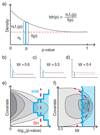Data-driven hypothesis weighting increases detection power in genome-scale multiple testing
- PMID: 27240256
- PMCID: PMC4930141
- DOI: 10.1038/nmeth.3885
Data-driven hypothesis weighting increases detection power in genome-scale multiple testing
Abstract
Hypothesis weighting improves the power of large-scale multiple testing. We describe independent hypothesis weighting (IHW), a method that assigns weights using covariates independent of the P-values under the null hypothesis but informative of each test's power or prior probability of the null hypothesis (http://www.bioconductor.org/packages/IHW). IHW increases power while controlling the false discovery rate and is a practical approach to discovering associations in genomics, high-throughput biology and other large data sets.
Figures



References
-
- Benjamini Y, Hochberg Y. Controlling the false discovery rate: a practical and powerful approach to multiple testing. Journal of the Royal Statistical Society. Series B (Statistical Methodology) 1995:289–300.
-
- Benjamini Y, Krieger AM, Yekutieli D. Adaptive linear step-up procedures that control the false discovery rate. Biometrika. 2006;93:491–507.
-
- Storey JD, Taylor JE, Siegmund D. Strong control, conservative point estimation and simultaneous conservative consistency of false discovery rates: a unified approach. Journal of the Royal Statistical Society: Series B (Statistical Methodology) 2004;66:187–205.
-
- Efron B. Large-scale inference: Empirical Bayes methods for estimation, testing, and prediction. Cambridge University Press; 2010.
Publication types
MeSH terms
LinkOut - more resources
Full Text Sources
Other Literature Sources
Molecular Biology Databases

